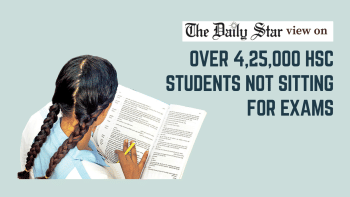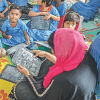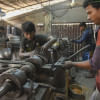Rise in school dropout rate concerning

We are deeply concerned by the surge in the school dropout rate after a steady decline over 14 years. According to the Annual Primary School Statistics (APSS) 2024 released by the Directorate of Primary Education (DPE), the primary school dropout rate increased to 16.25 percent in 2024, up from 13.15 percent in 2023. The report also revealed that dropout rates tend to increase as students advance to higher grades, indicating that many face escalating challenges as they progress through the school education cycle. Another concerning finding is that the dropout rate is high among boys, which surged to 19.02 percent in 2024 from 14.12 percent in 2023, while the rate for girls rose slightly to 13.36 percent from 12.32 percent. The authorities need to address the root causes of this sudden turnaround, otherwise we may lose the progress made over years in boosting primary school enrolment and reducing dropout rates.
In 2010, nearly four in 10 students reportedly failed to complete the primary education cycle. Since then, Bangladesh has made notable progress through measures such as free textbook distribution, expanded stipend coverage, and mid-day meals. By 2020, the rate fell to 17.02 percent from 39.8 percent in 2010, which further dropped to 13.15 percent in 2023, a remarkable improvement. However, political unrest during and after the July uprising last year caused major disruptions across the education sector, including schools and colleges. The DPE report identified several other factors behind the rise in dropout rates. It noted that rising inflation and living costs may have eroded the real value of student stipends, making education less affordable for many families. Additionally, seasonal migration, household economic shocks, and climate-related hardships intensified these challenges, particularly among the disadvantaged communities.
At a time when the country is expected to advance towards universal education as well as achieving the Sustainable Development Goals, we cannot afford to backtrack on our hard-earned progress in this regard. We urge the government to address the issue by taking targeted interventions, such as introducing inflation-adjusted stipends, reviving the school feeding programme, and providing students with free or subsidised educational materials such as exercise books, pens, and pencils. Experts believe that investing more in primary education is crucial to keeping students in school and ensuring quality education. We hope the government will act on these suggestions properly.


 For all latest news, follow The Daily Star's Google News channel.
For all latest news, follow The Daily Star's Google News channel. 









Comments